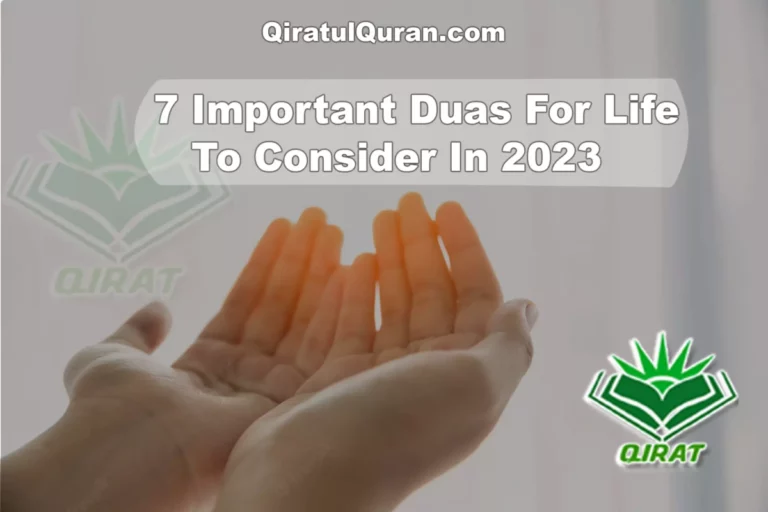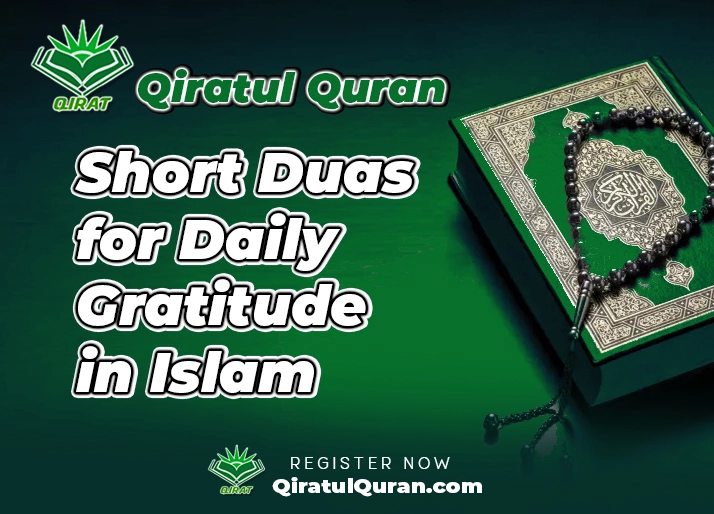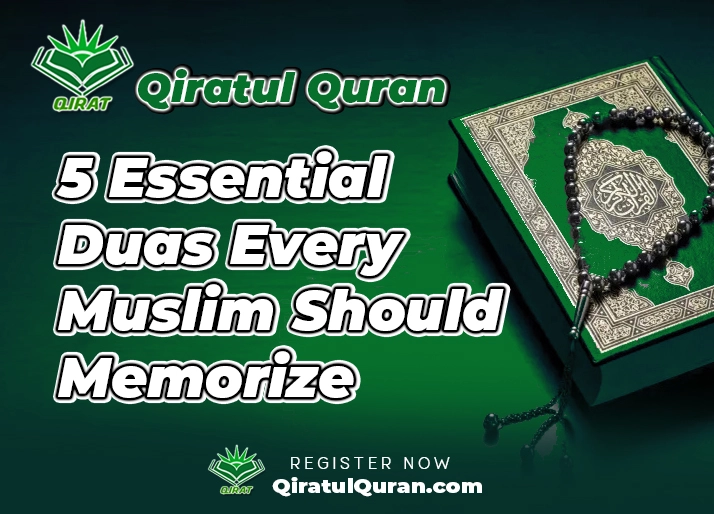Dhikr and Dua After Prayer: The Importance of Remembrance
The ritual prayers in Islam, known as salah or namaz, do not end when one says the closing salutations. An integral part of the prayer is what comes afterward: the dhikr and dua, or remembrance and supplication. For a prayer to be complete and perfect, it is essential to follow it up with these rituals of remembering Allah and invoking His blessings. Qiratul Quran will guide you all through the importance of dhikr and duas after daily prayer and their impression on our daily lives.

Why Dhikr and Dua Are Essential After Salah
Dhikr and dua after the obligatory prayers have been especially emphasized in the Islamic tradition. Here are some of the main reasons they are considered an integral part of salah:
Continuity of God Consciousness
The state of humility, concentration, and God consciousness attained during salah should not end abruptly. Dhikr and dua after prayer ensure that the spiritual effects of salah are prolonged. Rather than jumping straight back into worldly affairs, remembrance and invocation keep the heart in the presence of Allah.
Obeying the Prophet’s Guidance
The Prophet Muhammad صلى الله عليه وسلم consistently made dhikr and dua after completing his prayers. He encouraged his followers to do the same, teaching specific adhkar and supplications to be recited. Following his example and guidance reflects one’s love for the Prophet صلى الله عليه وسلم.
Purification of Sins
The Prophet صلى الله عليه وسلم said: “Whoever makes dhikr of Allah after every prayer will be forgiven all his sins even if they are as much as the foam of the sea.” Dhikr and dua after salah are means of expiation for any shortcomings within the prayer itself.
Protection from Harm
Reciting certain adhkar like Ayat-al-Kursi and the supplications prescribed by the Prophet صلى الله عليه وسلم after prayer provide spiritual protection from all forms of danger and evil. They bring divine assistance against anything that may lead to sin.
Attainment of Rewards
Just like the prayer itself, dhikr and dua after salah also earn immense rewards as acts of worship. Every tasbeehah (glorification), takbeerah (magnification) and dua is recorded in one’s book of deeds, while also helping to blot out misdeeds.
Prescribed Dhikr After Fardh Prayers
Scholars concur that there are three main adhkar that the Prophet صلى الله عليه وسلم consistently recited after completing the fardh (obligatory) prayers:
Tasbeeh Fatimah
This involves reciting SubhanAllah (Glory be to Allah) 33 times, Alhamdulillah (All praise is for Allah) 33 times, and Allahu Akbar (Allah is the Greatest) 34 times. This well-known dhikr also known as Tasbeeh Fatimi totals 100 glorifications.
Reciting Ayat Al-Kursi
The powerful Ayat Al-Kursi (verse 255 of Surah Al-Baqarah) provides immense protection against all types of evil and danger. The Prophet صلى الله عليه وسلم described it as the greatest verse of the Quran.
Durood Ibrahimi
This prayer invokes blessings upon the Prophet صلى الله عليه وسلم and his family, as Allah instructed in the Quran: “Indeed, Allah confers blessing upon the Prophet, and His angels [ask Him to do so]. O you who have believed, ask [Allah to confer] blessing upon him and ask [Allah to grant him] peace.” (33:56)
In addition to this main adhkar, there are numerous other tasbeehat, tahleel (saying La ilaha illAllah) and takbeerat that the Prophet صلى الله عليه وسلم would recite. However, the above three are specifically emphasized in the ahadith.
Etiquettes of Dhikr After Salah
For dhikr after prayer to be effective and rewarding, there are certain etiquettes to observe:
- Face the qiblah while engaging in dhikr. If sitting on the musalla, do not turn away from the direction of prayer.
- Recite the adhkar softly and avoid disturbing others if praying in congregation.
- Alternate between the different forms of tasbeeh, tahmeed, takbeer, etc. Do not just stick to one form.
- Ponder and reflect on the meanings being recited. Do not let it become a hollow, ritualistic exercise.
- Do not limit it to a specific number. Continue as long as desired.
- Maintain wudhu to gain extra rewards and have the invocation accepted.
- Follow the sunnah way precisely and avoid innovative dhikr formulas.
Prescribed Supplications After Fardh Prayers
After completing the dhikr, it is sunnah to raise one’s hands and invoke Allah with relevant supplications. Some of the masnoon dua after fardh prayers include:
Seeking Forgiveness Thrice
The Prophet صلى الله عليه وسلم would ask Allah’s forgiveness thrice by reciting the supplication:
اَللَّهُمَّ أَنْتَ السَّلاَمُ، وَمِنْكَ السَّلاَمُ، تَبَارَكْتَ يَا ذَا الْجَلاَلِ وَالإِكْرَامِ
Allaahumma anta al-salaamu wa minka al-salaamu, tabaarakta yaa dhal-jalaali wal-ikraam
“O Allah, You are As-Salam (The One free from all defects), and from You is all peace, blessed are You, O Possessor of majesty and honor.”
General Supplication
The Prophet صلى الله عليه وسلم taught an all-encompassing dua to ask Allah for all that is good in this world and the next:
اَللَّهُمَّ إِنِّي أَسْأَلُكَ الْعَفْوَ وَالْعَافِيَةَ فِي الدُّنْيَا وَالآخِرَةِ، اَللَّهُمَّ إِنِّي أَسْأَلُكَ الْعَفْوَ وَالْعَافِيَةَ فِي دِينِي وَدُنْيَايَ وَأَهْلِي وَمَالِي، اَللَّهُمَّ اسْتُرْ عَوْرَاتِي وَآمِنْ رَوْعَاتِي، اَللَّهُمَّ احْفَظْنِي مِنْ بَيْنِ يَدَيَّ وَمِنْ خَلْفِي وَعَنْ يَمِينِي وَعَنْ شِمَالِي، وَمِنْ فَوْقِي، وَأَعُوذُ بِعَظَمَتِكَ أَنْ أُغْتَالَ مِنْ تَحْتِي
Allaahumma inni as-aluka’l-‘afwa wal ‘aafiyah fid dunyaa wal aakhiroh. Allaahumma inni as-aluka’l-‘afwa wal ‘aafiyah fee deeni wa dunyaaya wa ahli wa maali. Allaahummas-tur ‘awraatee [‘awrati] wa aamin raw‘aatee [raw‘ati]. Allaahummahfazhnee mim bayni yadayya wa min khalfi wa ‘an yameeni wa ‘an shimaali wa min fawqi wa ‘audhu bi ‘azhomatik an ughtala min tahti.
“O Allah, I ask You for pardon and well-being in this life and the next. Ya Allah, I ask You for pardon and well-being in my religious and worldly affairs, and my family and my wealth. O Allah, veil my weaknesses and set at ease my dismay. O Allah, preserve me from the front and from behind and on my right and on my left and from above, and I take refuge with You lest I be swallowed up by the earth.”
Protection from Debt
The Prophet صلى الله عليه وسلم sought refuge from the burden of debt by reciting:
اَللَّهُمَّ اكْفِنِي بِحَلاَلِكَ عَنْ حَرَامِكَ وَأَغْنِنِي بِفَضْلِكَ عَمَّنْ سِوَاكَ
Allaahummak-fini bihalaalika ‘an haraamik wa aghnini bifadlika ‘amman siwaak
“O Allah, suffice me with what You have allowed over what You have forbidden, and make me independent of all others besides You.”
Well-Being in this World and the Next
The Prophet صلى الله عليه وسلم made this comprehensive dua for well-being in both worlds:
اَللَّهُمَّ إِنِّي أَسْأَلُكَ الْعَافِيَةَ فِي الدُّنْيَا وَالْآخِرَةِ، اَللَّهُمَّ إِنِّي أَسْأَلُكَ الْعَفْوَ وَالْعَافِيَةَ فِي دِينِي وَدُنْيَايَ وَأَهْلِي وَمَالِي، اَللَّهُمَّ اسْتُرْ عَوْرَاتِي وَآمِنْ رَوْعَاتِي، اَللَّهُمَّ احْفَظْنِي مِنْ بَيْنِ يَدَيَّ وَمِنْ خَلْفِي وَعَنْ يَمِينِي وَعَنْ شِمَالِي، وَمِنْ فَوْقِي، وَأَعُوذُ بِعَظَمَتِكَ أَنْ أُغْتَالَ مِنْ تَحْتِ
Allaahumma inni as-alukal ‘aafiyata fid dunyaa wal aakhiroh. Allaahumma inni as-alukal ‘afwa wal ‘aafiyata fee deeni wa dunyaaya wa ahli wa maali. Allaahummas-tur ‘awraatee [‘awrati] wa aamin raw‘aatee [raw‘ati]. Allaahummahfaznee mim bayni yadayya wa min khalfi wa ‘an yameeni wa ‘an shimaali wa min fawqi wa ‘a’oothu bi ‘azhomatik an ughtala min tahti.
“O Allah, I ask You for well-being in this life and the next. Ya Allah, I ask You for pardon and well-being in my religious and worldly affairs, and my family and my wealth. Ya Allah, veil my weaknesses and set at ease my dismay. O Allah, preserve me from the front and from behind and on my right and on my left and from above, and I take refuge with You lest I be swallowed up by the earth.”
Remembering Allah Throughout the Day
While dhikr after salah is specially emphasized, remembrance of Allah is something we should engage in at all times. The Prophet صلى الله عليه وسلم encouraged constant dhikr throughout the day and night, as it brings immense reward and drives away laziness. Some easy forms of dhikr to incorporate daily include:
- Reciting subhanAllah, Alhamdulillah and Allahu akbar after obligatory and voluntary prayers
- Making dua while using the washroom, before and after eating, and at the time of rainfall
- Reading morning and evening adhkar for protection, forgiveness and mercy
- Frequently sending blessings on the Prophet صلى الله عليه وسلم
- Tasbeeh of Kalimah Tayyab after salah and before sleeping
- Seeking istighfar and reciting dhikr while travelling or waiting
- Setting daily litanies (awrad) of glorification, tahleel and takbeer
Benefits of Constant Remembrance
Abundant dhikr brings tremendous benefits to one’s spiritual, emotional and practical life. Some of the key benefits are:
Stronger Faith and Nearness to Allah
Frequent remembrance of Allah increases faith, God-consciousness and closeness to the Divine. It washes away sins and illuminates the heart.
Inner Peace and Contentment
Dhikr provides spiritual comfort. The heart finds rest and satisfaction in the remembrance of Allah. It treats anxiety, distress and discontentment.
Protection from Evil
Constant dhikr and dua are a shield against trials, misfortunes and the evil promptings of Satan. It keeps one steadfast on the Straight Path.
Blessings in Sustenance
Those who engage in abundant dhikr and tasbeeh find greater barakah in their sustenance, deals, life and health, as promised by Allah and His Messenger صلى الله عليه وسلم.
Acceptance of Good Deeds
When dhikr becomes the backbone of one’s life, it infuses the quality of Ikhlas into good deeds, increasing the chances of their acceptance.
Focus and Productivity
Regularly remembering Allah throughout the day keeps one mentally focused and enhances effective performance, productivity and concentration in tasks.
In Summary
Dhikr and dua after the fardh prayers are integral parts of salah emphasized by the Prophet Muhammad صلى الله عليه وسلم. He prescribed certain adhkar and supplications which bring immense benefits and rewards. Furthermore, constant remembrance at all times earns the love.





